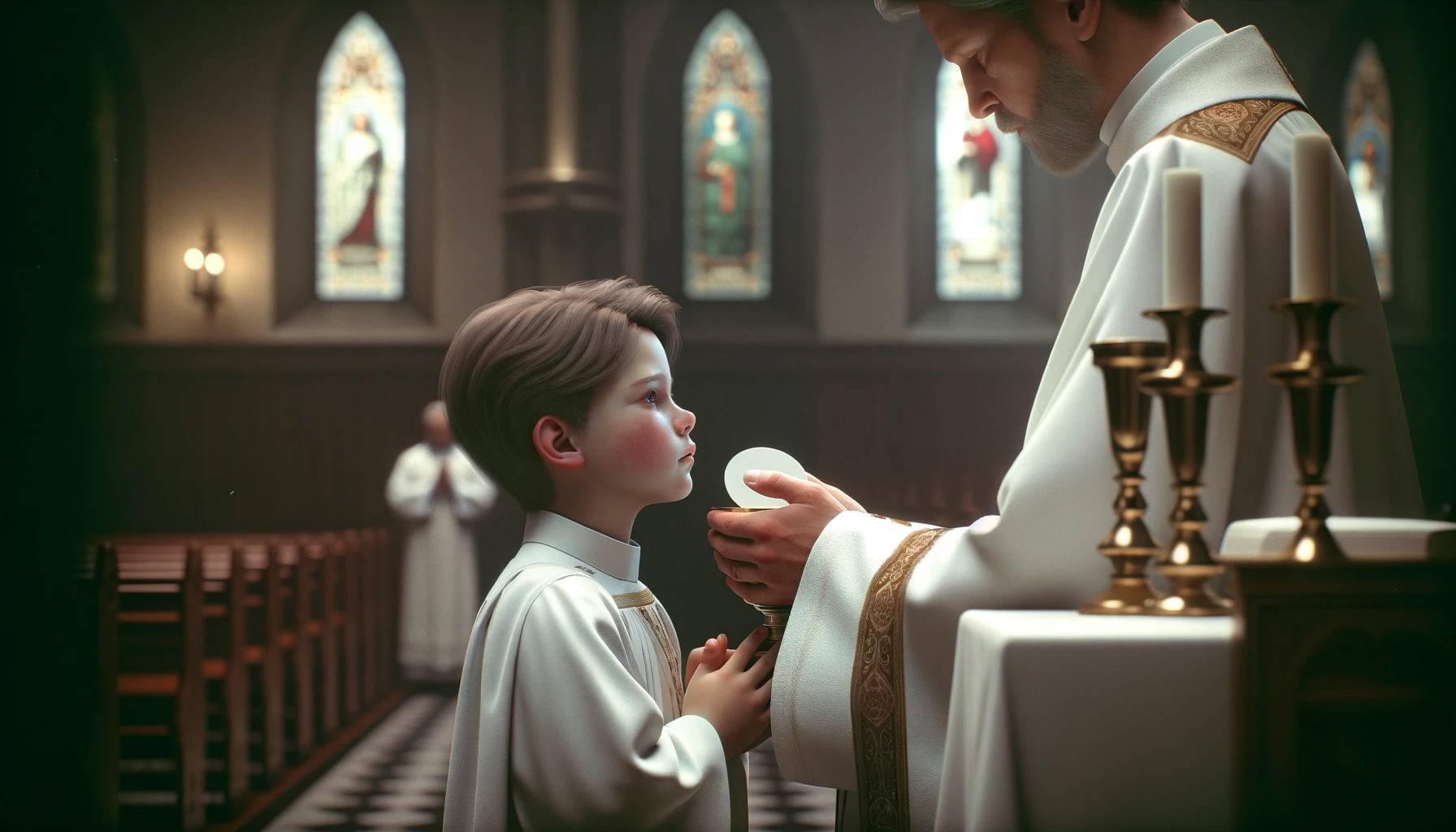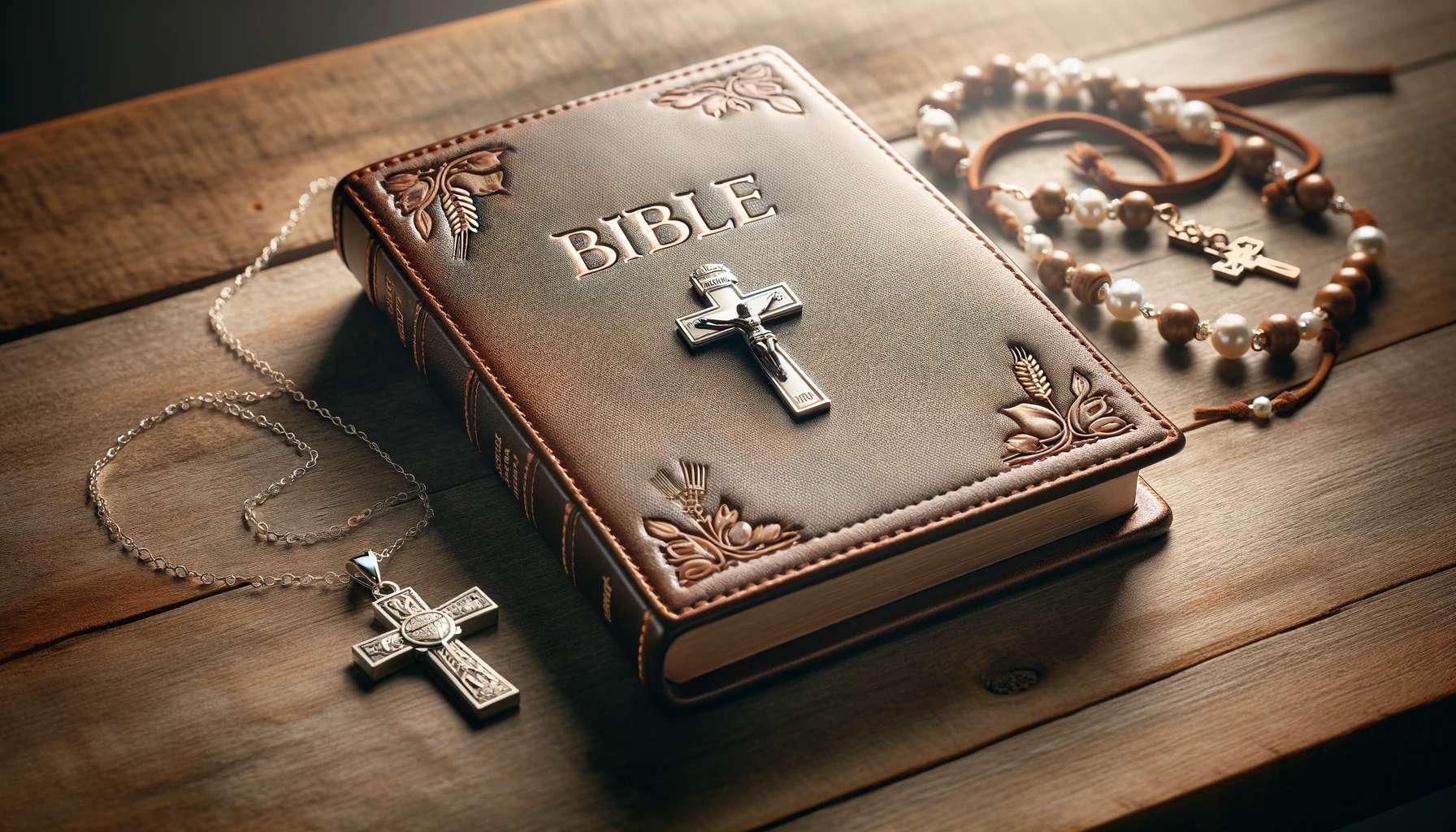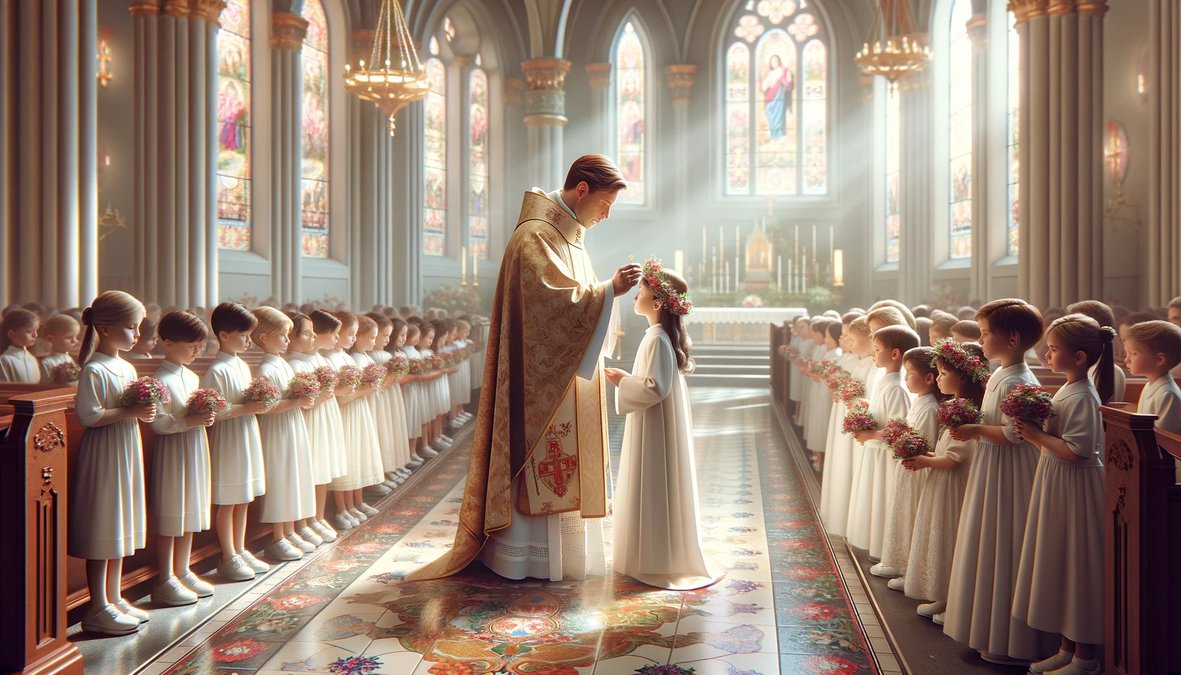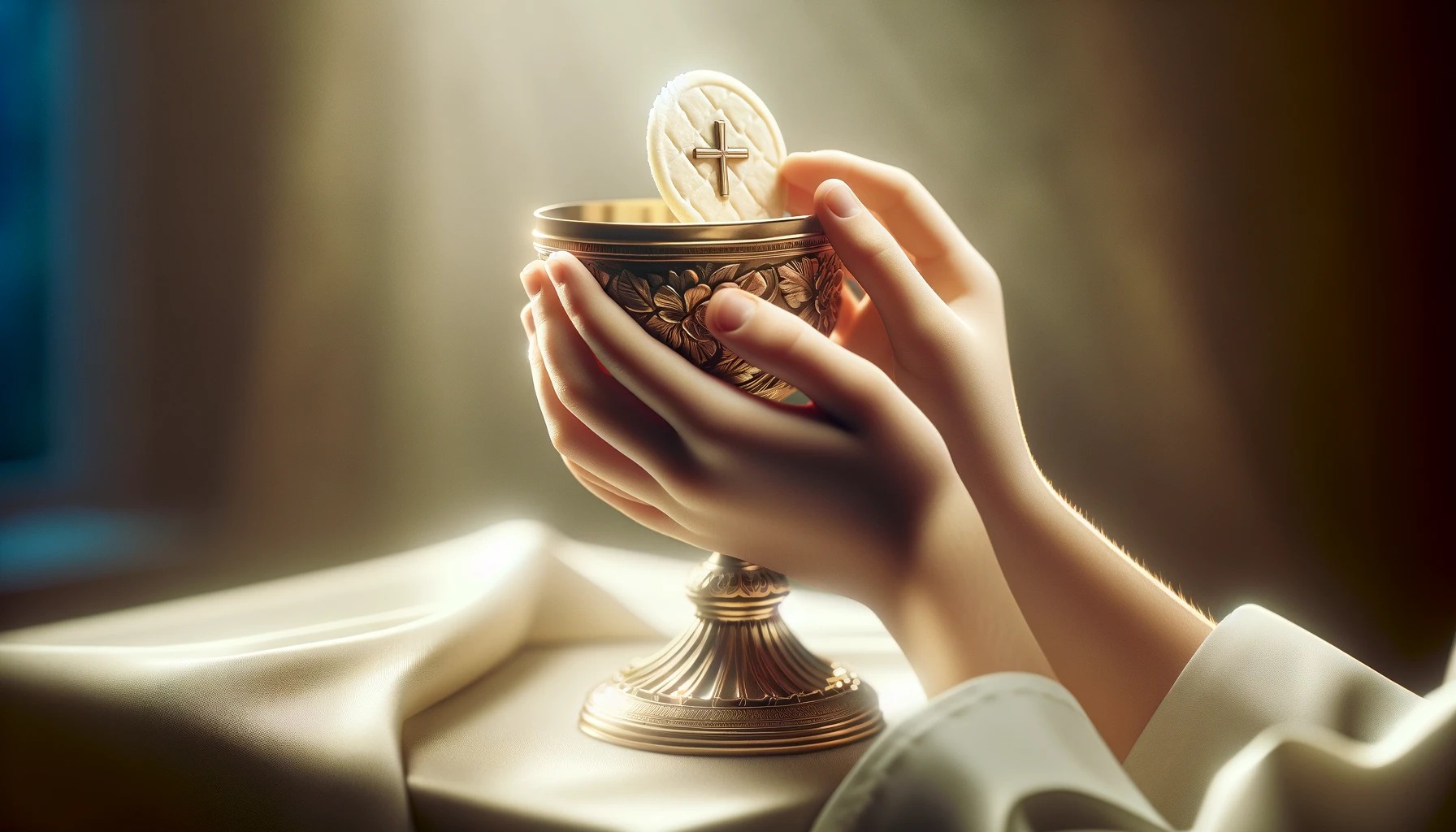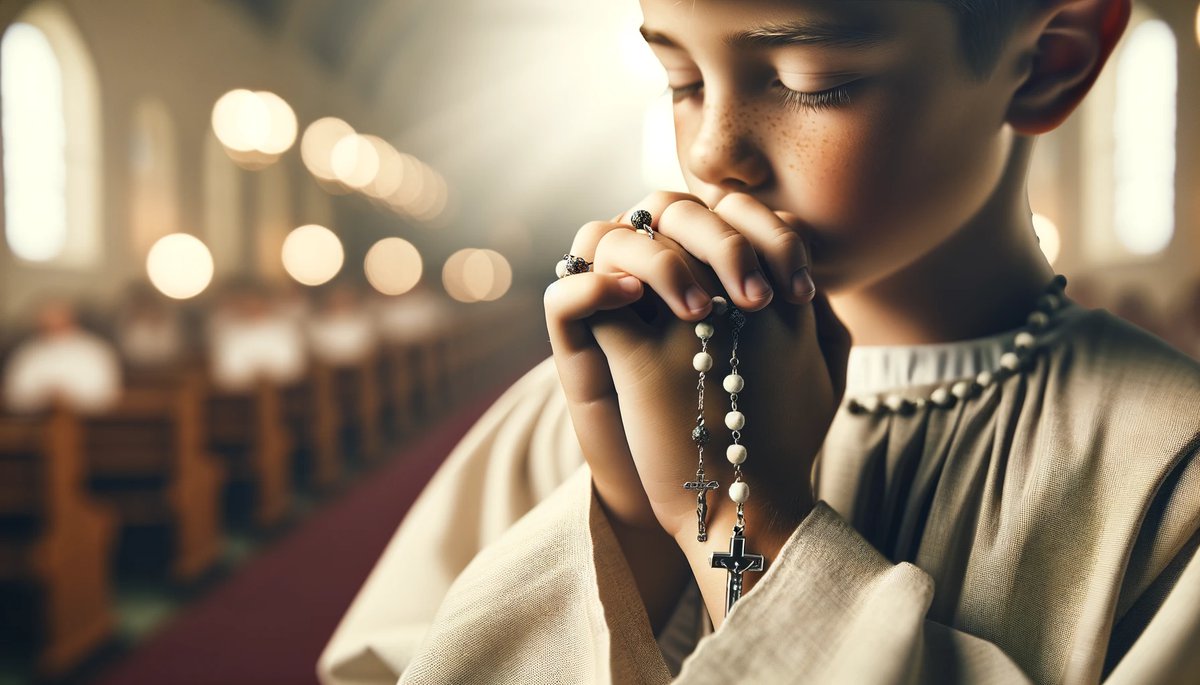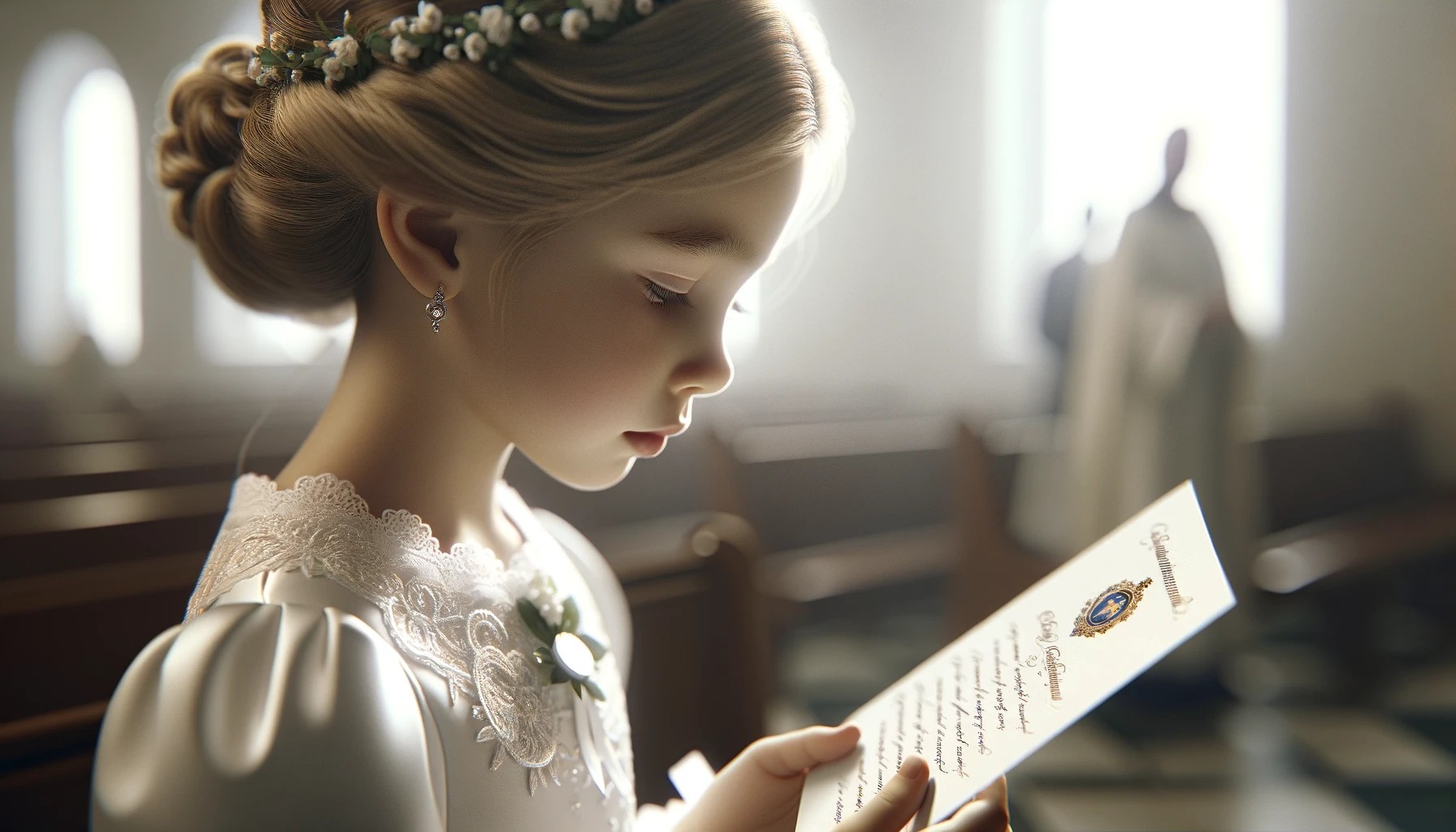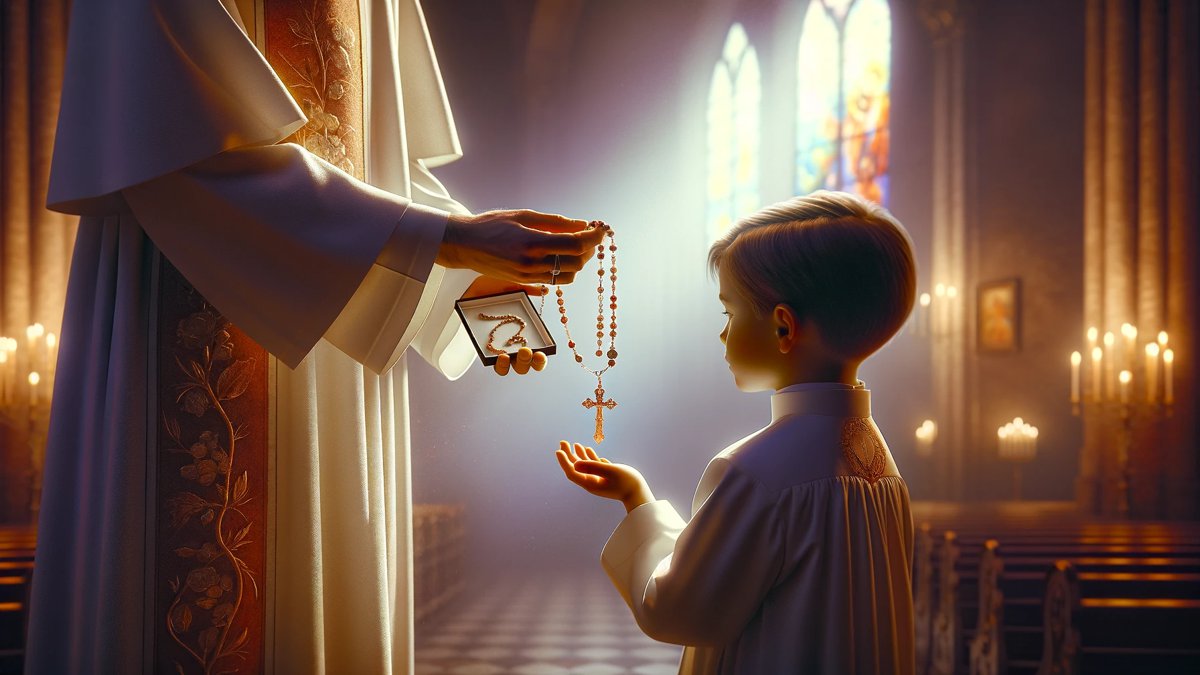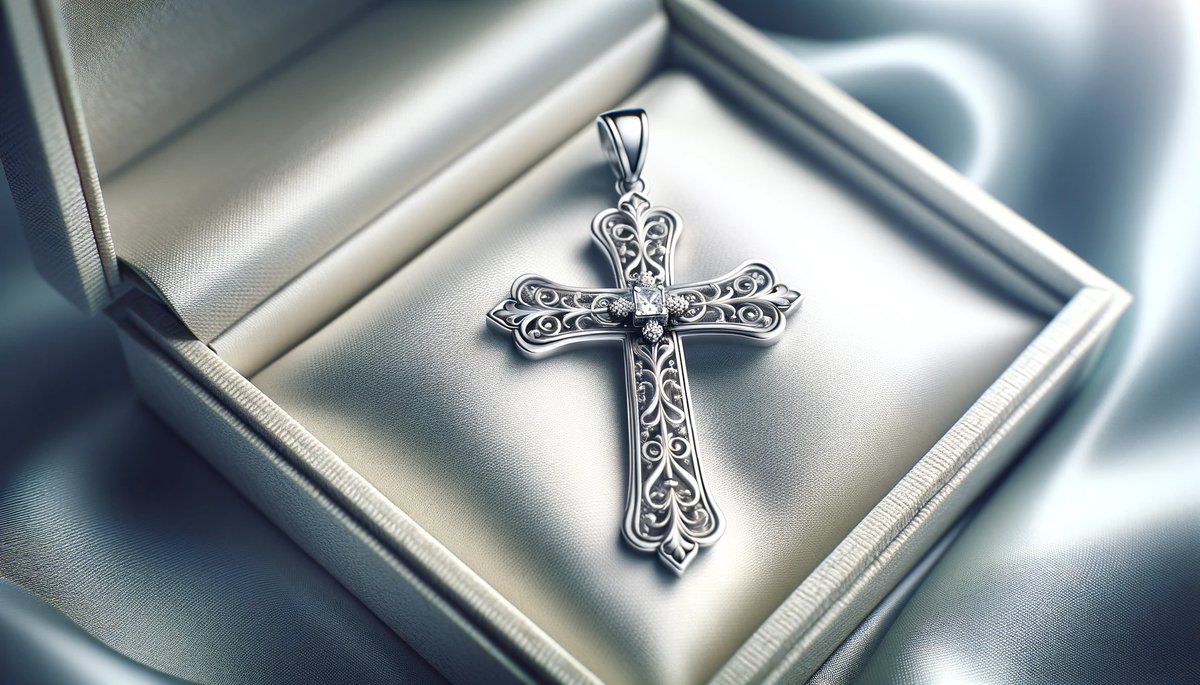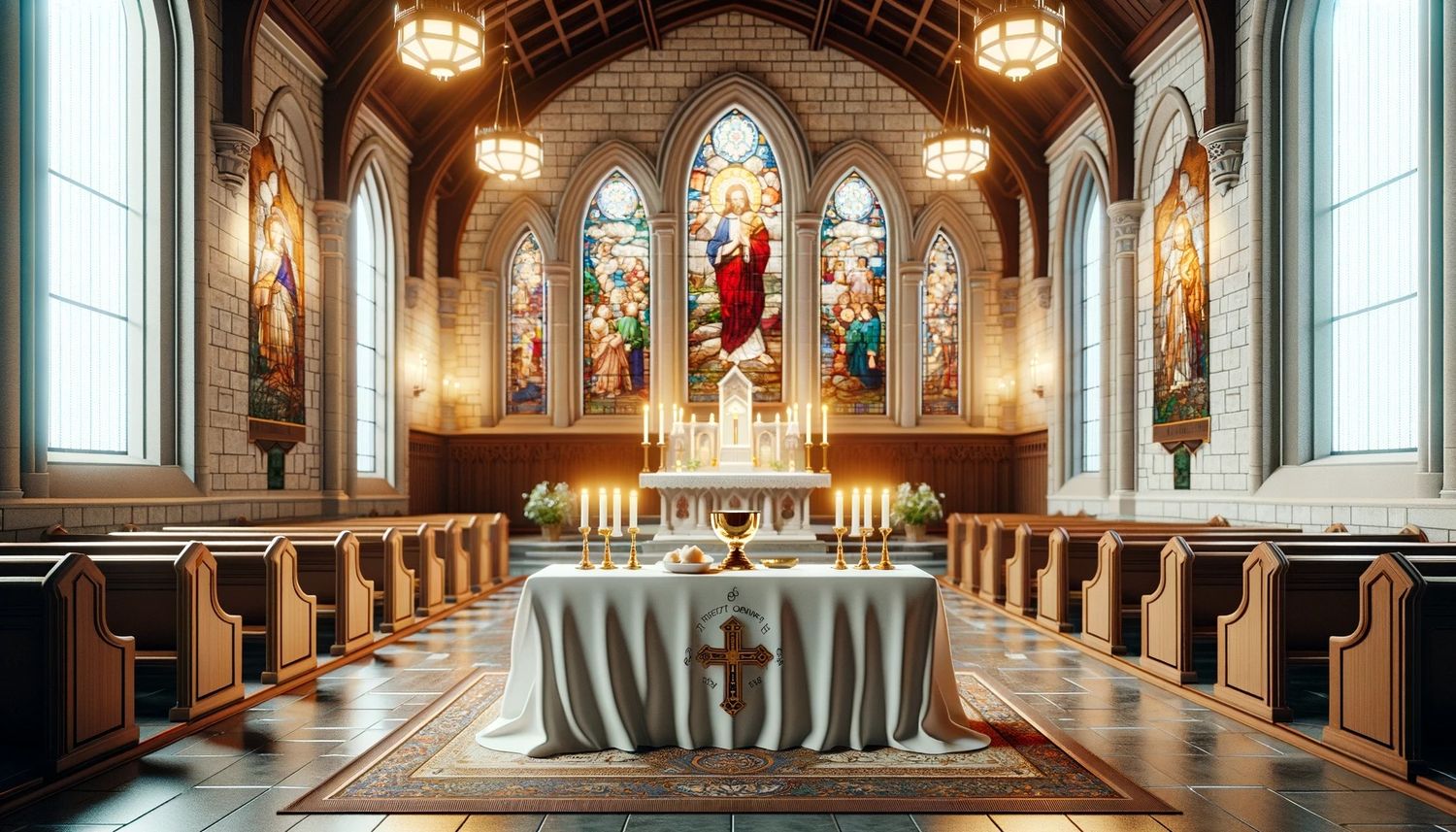Home>Theology and Spirituality>What Is First Communion?


Theology and Spirituality
What Is First Communion?
Published: February 24, 2024
Jason DeRose, Managing Editor at Christian.net, uses his expertise in religion and journalism to deepen understanding of faith's societal impacts. His editorial leadership, coupled with a strong academic background, enriches the platform’s diverse content, earning him recognition in both journalism and religious circles.
Learn about the significance and traditions of First Communion in the theology and spirituality of Christianity. Discover the spiritual importance of this sacred rite.
(Many of the links in this article redirect to a specific reviewed product. Your purchase of these products through affiliate links helps to generate commission for Christian.net, at no extra cost. Learn more)
Table of Contents
Introduction
First Communion is a momentous event in the lives of young Christians, particularly those of the Catholic faith. It marks a significant milestone in their spiritual journey and is often celebrated with great joy and reverence. This sacred rite, also known as the Holy Eucharist, holds deep religious and cultural significance, symbolizing the reception of the body and blood of Jesus Christ.
During First Communion, children partake in the Eucharist for the first time, typically around the age of seven or eight. This pivotal occasion is a fundamental sacrament in the Catholic Church, signifying the initiation of children into the full participation of the Mass and the reception of the Eucharist. It is a moment of profound spiritual significance, as it signifies the child's growing understanding of their faith and their readiness to partake in the holiest sacrament of the Catholic Church.
The journey towards First Communion is a time of spiritual preparation and learning, during which children deepen their understanding of the significance of the Eucharist and the teachings of the Church. It is a period of growth and reflection, as they embrace the teachings of Jesus Christ and the values of compassion, love, and forgiveness.
First Communion is not only a personal milestone but also a joyous occasion for families and communities. It is a time of celebration, where loved ones gather to witness and support the children as they take this momentous step in their faith journey. The event is often marked by special ceremonies, gatherings, and traditions that hold deep cultural and familial significance.
In the following sections, we will delve deeper into the significance of First Communion, the preparation involved, the ceremony itself, and the rich traditions and customs associated with this sacred milestone in the lives of young Christians.
Read more: What To Wear At A First Communion
The Significance of First Communion
First Communion holds profound significance in the lives of young Christians, particularly those of the Catholic faith. It is a pivotal moment that symbolizes the initiation of children into the full participation of the Mass and the reception of the Eucharist. This sacred rite is deeply rooted in the teachings and traditions of the Catholic Church, carrying immense spiritual, cultural, and familial importance.
At the heart of the significance of First Communion lies the belief in the real presence of Jesus Christ in the Eucharist. According to Catholic doctrine, during the consecration of the bread and wine, they become the body and blood of Christ. Therefore, when children receive the Eucharist for the first time, they are partaking in the divine presence of Jesus in a deeply personal and profound way. This act of receiving the body and blood of Christ is a central sacrament in the Catholic faith, representing the spiritual nourishment and unity with Christ and the Church.
First Communion also marks a crucial stage in a child's spiritual journey. It signifies their growing understanding of the teachings of Jesus Christ and their readiness to embrace the values of love, compassion, and forgiveness. Through the reception of the Eucharist, children are encouraged to deepen their relationship with God and to live out the teachings of Christ in their daily lives. It is a moment of spiritual awakening and a step towards assuming a more active role within the faith community.
Furthermore, First Communion is a joyous occasion that fosters a sense of belonging and unity within the family and the broader Christian community. It is a time of celebration and reflection, where families and friends come together to support and witness the children as they take this significant step in their faith journey. The event serves as a reminder of the importance of faith, love, and togetherness, strengthening the bonds of kinship and community.
In essence, the significance of First Communion extends beyond a mere religious ritual; it embodies the spiritual growth, unity, and communal celebration within the Catholic faith. It is a cherished milestone that shapes the faith identity of young Christians and serves as a testament to the enduring traditions and teachings of the Catholic Church.
Preparation for First Communion
The journey towards First Communion is a period of profound spiritual preparation and learning for young Christians. It is a time when children, typically around the age of seven or eight, engage in a process of religious education and spiritual formation to understand the significance of the Eucharist and the responsibilities that come with receiving this sacrament.
The preparation for First Communion often begins months in advance and involves a structured program of religious instruction, often provided through the church or parochial school. During this time, children are guided through a curriculum that covers essential aspects of the Catholic faith, including the significance of the Eucharist, the sacraments, the life and teachings of Jesus Christ, and the importance of prayer and service to others.
Central to the preparation process is the understanding of the Eucharist as the body and blood of Jesus Christ. Children are taught about the Last Supper, where Jesus instituted the Eucharist, and the profound symbolism of the bread and wine as the body and blood of Christ. They learn about the spiritual nourishment and unity with Christ that comes with receiving the Eucharist and the reverence and respect that should accompany this sacred act.
In addition to doctrinal instruction, children are encouraged to engage in spiritual reflection and personal growth. They are taught the significance of confession and reconciliation, emphasizing the importance of seeking forgiveness and living a life in accordance with the teachings of Jesus. Through this process, children are encouraged to cultivate a deeper relationship with God and to embody the values of love, compassion, and empathy in their daily lives.
As part of their preparation, children also participate in special rites and rituals, such as the Sacrament of Reconciliation, where they confess their sins and seek absolution, and the Rite of Enrollment, where they express their desire to receive the Eucharist for the first time. These ceremonies serve as poignant milestones in their journey towards First Communion, reinforcing their commitment to their faith and the responsibilities that come with receiving the Eucharist.
Overall, the preparation for First Communion is a transformative period that nurtures the spiritual growth and understanding of young Christians. It is a time of learning, reflection, and personal development, laying the foundation for a deeper connection with their faith and the sacred sacrament of the Eucharist.
The Ceremony of First Communion
The Ceremony of First Communion is a deeply significant and sacred event within the Catholic faith, marking the culmination of a period of spiritual preparation and the initiation of children into the reception of the Eucharist. This reverent occasion is characterized by a rich tapestry of rituals, symbols, and traditions that reflect the profound significance of the Eucharist and the unity of the faith community.
The day of First Communion is often filled with a sense of anticipation and reverence, as children, dressed in their finest attire, gather with their families and fellow communicants to partake in this momentous sacrament. The ceremony typically takes place within the context of a Mass, underscoring the communal nature of the Eucharist and the unity of the faithful in partaking in the body and blood of Christ.
Central to the Ceremony of First Communion is the Liturgy of the Eucharist, where the consecration of the bread and wine takes place. As the priest recites the words of consecration, the bread and wine are transformed into the body and blood of Jesus Christ, signifying the real presence of Christ in the Eucharist. This sacred moment holds profound significance as the culmination of the children's spiritual journey towards receiving the Eucharist for the first time.
The communicants, accompanied by their families and often their sponsors, approach the altar to receive the Eucharist. This act of receiving the body and blood of Christ is a deeply personal and reverent experience, symbolizing the unity of the communicants with Christ and the faith community. It is a moment of profound spiritual significance, as the children partake in the divine presence of Jesus in a tangible and transformative way.
Throughout the ceremony, various rituals and symbols enrich the experience of First Communion. The communicants may present gifts of bread and wine, symbolizing their participation in the offering of the Eucharist. Additionally, the children may receive a special First Communion candle, signifying the light of Christ and their role as bearers of this light in the world.
The Ceremony of First Communion is not only a deeply spiritual event but also a joyous celebration of faith, love, and unity. It is a time when families, friends, and the faith community come together to support and witness the children as they take this significant step in their faith journey. The day is often marked by festive gatherings, feasting, and the exchange of meaningful gifts, creating lasting memories for the communicants and their loved ones.
In essence, the Ceremony of First Communion is a sacred and celebratory occasion that encapsulates the spiritual significance of the Eucharist and the communal joy of embracing the teachings and traditions of the Catholic faith. It is a testament to the enduring values of love, unity, and spiritual nourishment that lie at the heart of this sacred sacrament.
Traditions and Customs Associated with First Communion
The celebration of First Communion is steeped in rich traditions and customs that reflect the profound significance of this sacred milestone in the lives of young Christians. These traditions, passed down through generations, serve to honor the spiritual journey of the communicants and to create enduring memories of faith, love, and unity within the community.
One of the most cherished traditions associated with First Communion is the attire worn by the communicants. For girls, this often includes wearing a white dress, symbolizing purity and the radiance of the soul as they receive the body of Christ for the first time. Accompanying the dress may be a veil or floral headpiece, adding a touch of elegance and reverence to the occasion. Boys traditionally wear a suit or formal attire, signifying their solemn commitment to their faith and the responsibilities that come with receiving the Eucharist.
The exchange of meaningful gifts is another customary practice during First Communion. Communicants often receive religious tokens such as a crucifix, rosary, or a prayer book, symbolizing their continued journey of faith and devotion. These gifts serve as tangible reminders of the significance of the Eucharist and the enduring values of the Catholic faith.
In many cultures, First Communion is commemorated with festive gatherings and elaborate feasts. Families and friends come together to celebrate this joyous occasion, often hosting receptions or parties filled with delectable food, music, and heartfelt expressions of love and support for the communicants. These gatherings foster a sense of community and togetherness, underscoring the importance of faith and familial bonds.
The act of receiving a special First Communion candle is a poignant tradition that holds deep symbolism. The candle, often adorned with religious motifs, represents the light of Christ and the role of the communicants as bearers of this light in the world. It serves as a tangible reminder of their commitment to live out the teachings of Jesus and to be a source of light and hope in their communities.
Additionally, certain cultural customs and rituals may accompany the celebration of First Communion, adding a unique and personal touch to the occasion. These may include traditional dances, songs, or blessings performed by family members or community elders, further enriching the spiritual and cultural tapestry of the event.
In essence, the traditions and customs associated with First Communion serve to honor the sacredness of the Eucharist and the spiritual growth of the communicants. They embody the enduring values of faith, love, and unity, creating a tapestry of cherished memories and cultural significance that resonate deeply within the hearts of the faithful.
Read more: What Comes First: Communion Or Confirmation
Conclusion
In conclusion, First Communion stands as a sacred and joyous milestone in the lives of young Christians, particularly those of the Catholic faith. This significant rite of passage symbolizes the initiation of children into the full participation of the Mass and the reception of the Eucharist, embodying profound spiritual, cultural, and familial significance.
The journey towards First Communion is marked by a period of spiritual preparation and learning, during which children deepen their understanding of the significance of the Eucharist and the teachings of the Church. It is a time of growth, reflection, and the embrace of the values of compassion, love, and forgiveness. The significance of First Communion extends beyond a mere religious ritual; it embodies the spiritual growth, unity, and communal celebration within the Catholic faith.
The Ceremony of First Communion is a deeply significant and sacred event, characterized by a rich tapestry of rituals, symbols, and traditions that reflect the profound significance of the Eucharist and the unity of the faith community. It is a time of anticipation, reverence, and communal celebration, where families, friends, and the faith community come together to support and witness the children as they take this significant step in their faith journey.
The celebration of First Communion is steeped in rich traditions and customs that honor the spiritual journey of the communicants and create enduring memories of faith, love, and unity within the community. These traditions, passed down through generations, serve to underscore the significance of the Eucharist and the enduring values of the Catholic faith.
In essence, First Communion is a cherished milestone that shapes the faith identity of young Christians and serves as a testament to the enduring traditions and teachings of the Catholic Church. It is a time of spiritual awakening, communal joy, and the embodiment of the values of faith, love, and togetherness. As children partake in the Eucharist for the first time, they embrace the real presence of Jesus Christ in a deeply personal and profound way, setting the stage for a lifelong journey of faith, love, and spiritual fulfillment.

